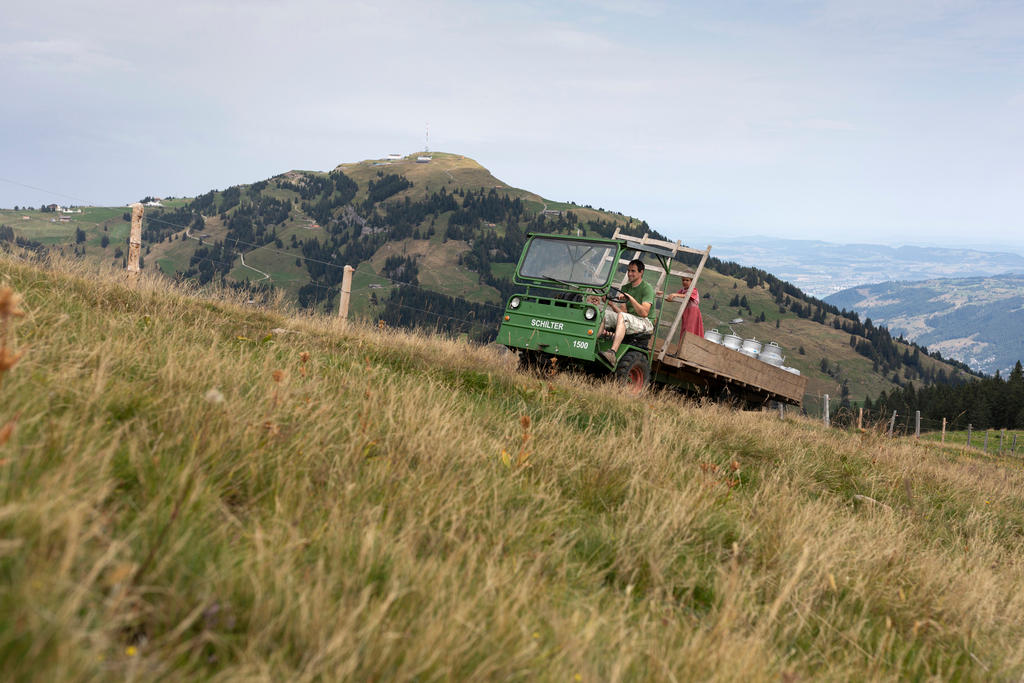Next decade ‘will be decisive’ for climate crisis

Keeping the Earth’s temperature rise to only 1.5 degrees Celsius (2.7 degrees Fahrenheit) is “in principle possible”, according to one of the Swiss contributors to the latest UN climate report, but time is running out and the next ten years are going to be crucial.
To hit this target, society would have to enact “unprecedented” changes to how it consumes energy, travels and builds to meet a lower global warming target or it risks increases in heat waves, flood-causing storms and the chances of drought in some regions as well as the loss of species, the United Nations Intergovernmental Panel on Climate ChangeExternal link (IPCC) said on Monday in a statement announcing the report’s release.
Limiting the temperature rise to 1.5°C rather than the 2°C target agreed to at the Paris Agreement talks in 2015 would have “clear benefits to people and natural ecosystems”, it said. The global sea level would be 10cm lower by 2100 than with a 2°C target, the report said. This could reduce flooding and give the people that inhabit the world’s coasts, islands and river deltas time to adapt to climate change.

More
Swiss farmers told to adapt to the heat or go bust
The lower target would also reduce species loss and extinction and the impact on terrestrial, freshwater and coastal ecosystems, the report explained.
Sonia SeneviratneExternal link from the Institute of Atmospheric and Climate Science of the federal technology institute ETH Zurich and a lead author of the IPCC report says the most significant and new aspect of the report – which is based on the analysis of about 6,000 scientific studies – is that it acknowledges a difference between an increase in temperature of 1.5°C and 2°C.
“Half a degree more increases considerably the risk of scorching heat and extreme rainfall – around the world as well as in Switzerland,” she says, pointing out that an increase of 1.5°C worldwide means almost double that in Switzerland.
Since 1850, the average temperature of the planet has grown by one degree. An increase that may seem minimal, but whose effects are already clearly perceptible, Seneviratne stresses. “Just think about what happened this year, with fires in California or heatwaves and droughts, even in Switzerland.”
‘In principle possible’
The 1.5°C target is “in principle possible”, believes Andreas FischlinExternal link, professor at the ETHZ and one of the IPCC report’s review editors. However, a rapid and profound transformation at a technical and social level is necessary, he emphasises. “The next ten years will be decisive.”
In order to perform the shift, it will be necessary in particular to increase the share of renewables in the production of electricity – reaching 70-85% by 2050 against 25% today – and renounce coal completely. It will also be necessary to increase the absorption of CO2 from the atmosphere via the increase in wooded areas and the development of CO2 sequestration technologies.
CO2 sequestration is a field in which Switzerland is “at the forefront” and can contribute greatly, Seneviratne believes. “The Zurich start-up ClimeworksExternal link is one of three global companies working on CO2 capture, but the problem is that this process is expensive at the moment and there are not yet any solutions for large-scale CO2 storage.”
We will soon see what effect the IPCC report will have on governments around the world. In December, negotiators and policy makers will gather in the Polish city of Katowice for the UN International Climate Conference COP24External link. In particular, countries will have to launch a process of reviewing the commitments made in 2015, which, according to projectionsExternal link, are insufficient to achieve even the less ambitious target of 2°C.
IPCC report
Ninety-one authors and review editors from 40 countries prepared the IPCC report in response to an invitation from the United Nations Framework Convention on Climate Change (UNFCCC) when it adopted the Paris Agreement in 2015.
The IPCC Special Report on Global Warming of 1.5C was prepared under the scientific leadership of all three IPCC working groups. Working Group I assesses the physical science basis of climate change; Working Group II addresses impacts, adaptation and vulnerability; and Working Group III deals with the mitigation of climate change.

In compliance with the JTI standards
More: SWI swissinfo.ch certified by the Journalism Trust Initiative












You can find an overview of ongoing debates with our journalists here . Please join us!
If you want to start a conversation about a topic raised in this article or want to report factual errors, email us at english@swissinfo.ch.